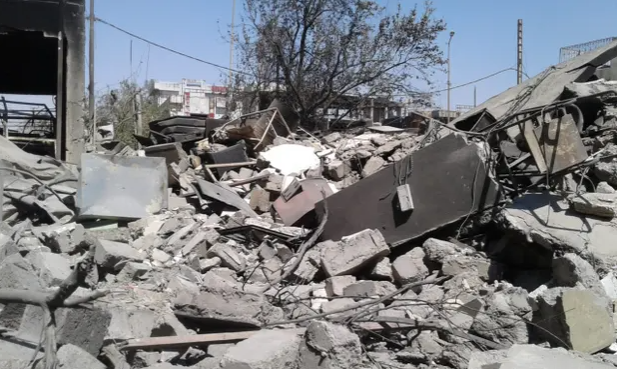An Iraqi man who alleges 35 family members were killed when an Australian airstrike targeting Islamic State instead obliterated a house where civilians were sheltering has been denied a compensation payment by the federal government.
The man, who did not wish to be identified, applied for what is known as an act of grace payment from the Department of Finance last year, arguing that there was strong evidence the Australian Defence Force dropped the bomb in 2017 as part of a series of airstrikes in Mosul by the coalition fighting IS.
But in December he was informed the payment would not be made, despite the delegate who made the decision not having access to an ADF report on whether one of its F/A-18 Super Hornet fighter jets was responsible for the airstrike.
It is understood the man, who is still based in Iraq, requested a payment in the low hundreds of thousands of dollars.
The man claims 35 people from his extended family, including 14 children, nine women and two imams, seven of whom were direct family members, died when a bomb was dropped on a house in the Al Shafaar neighbourhood on 13 June 2017.
In his application for an act of grace payment, the man’s Australian lawyers referred to information they argued supported the contention the ADF was responsible for the airstrike.
This information included media statements made by the ADF confirming its involvement in coalition airstrikes that may have killed civilians in the same neighbourhood on the same day.
In February 2019, the chief of joint operations, Air Marshal Mel Hupfeld, told reporters that two Australian planes had each dropped 500-pound bombs in Al Shafaar on 13 June 2017.
The airstrikes had come at the request of Iraqi security forces, Hupfield said, who were fighting a desperate battle against IS to recapture the western part of Mosul.
It was not until seven months later that the coalition became aware of reports the strikes had killed civilians after the matter was the subject of a report on the Airwars website, Hupfield said.
Hupfield said that because of this delay the ADF had been unable to verify how many civilians were killed, and whether the deaths occurred as a result of the Australian airstrike, nearby coalition airstrikes or “from other actors”. It was estimated that between six and 18 civilians had been killed.
He said the allegation the coalition was responsible for the deaths was assessed as “credible” but noted a degree of uncertainty surrounding the incident, including that the information provided about the strike did not “precisely correspond” with that held by the ADF.
“We do not definitively know how these people were killed, but we do know from our review of the events that our aircrew made no error in this mission,” Hupfield said.
“They delivered their ordinance precisely on to the designated target in accordance with their rules of engagement. All authorities for the strike were valid and lawful.
“There was no specific intelligence to indicate civilians were present at the targeted site, but given the urgent circumstances facing the Iraqi forces at the time, it was impossible to be certain.”
He went on to say that despite the airstrike hitting the exact coordinates provided by Iraqi force, “we’re not blaming the Iraqi security forces for this event or this incident. We’re very cognisant of the risk of inflicting civilian casualties in a very intense, complex war zone.
“The action in Mosul was the most ferocious air campaign that we have seen in our generation. It is an unfortunate consequence of war that these civilian casualties have occurred, and as I’ve said, this is not lost on us.”
In January 2019, the US defence department also assessed the report of civilian casualties as a result of a coalition airstrike as “credible”, finding that it was “likely” that 11 civilians were killed as a result of two coalition engagements on the same street.
In the decision to deny the man an act of grace payment, the finance department delegate makes clear they have not seen the ADF report on the airstrikes.
But the delegate said they nonetheless accepted the ADF’s advice that its investigation found there was no proof civilians were killed by an Australian airstrike.
On 29 March this year, the man’s lawyers applied for an internal review of the decision and requested that a new delegate be assigned the case.
Jacinta Lewin SC wrote that there was no other credible explanation for how the civilians were killed other than that the Australian government was responsible.
“To the extent that there is uncertainty about the precise details of the Australian airstrikes, this is a product of Defence’s refusal to provide information about them,” she wrote.
“Defence’s refusal should strengthen, rather than weaken, the conclusion that there is a real likelihood that Australian airstrikes were responsible for the deaths. If Defence possessed further information that weighed against that conclusion, presumably it would have been provided.
“This is an extremely serious matter that has caused unimaginable loss and trauma.”
Source (Click Here)


 RSS Feed
RSS Feed